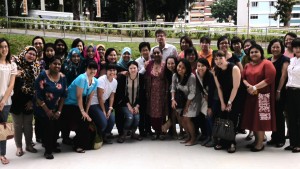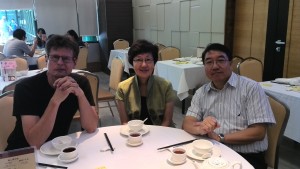Orientation project and IBM have been cooperating since 2009. The cooperation has been concentrated around the KidSmart heritage, see https://blogs.helsinki.fi/simulaatio/. The 10-year old tradition of providing Finnish early childhood education kindergartens and preschools KidSmart computers has now come to the end. We are happy to announce that the cooperation continues. IBM cooperation in Finnish early learning will continue and the flagship in 2015 will be analytics part of the Orientation 2.0′ project to understand how and why the kids do actually learn – the massive research to be done and data gatherer in four countries and with more than 100000 observations. The plan is that the IBM part of the research – the analytics – will be funded by IBM Impact Grant program funded by CSR / Celia. The discussions to proceed with the project to secure funding as part of IBM Impact Grant program have started. Descriptions of IBM analytics are introduced here.
Multicultural children and families
The importance of multicultural children and families in early childhood education is growing as the culture is becoming more global. Outi Arvola is making her doctoral thesis on the subject at the University of Turku, Finland. She is using the project data in her thesis. We will also use the project results for improving the conditions for the multicultural children in early childhood. Outi Arvola is interested in discussing the topic and the possibilities of international cooperation. Outi’ email address is outi.arvola@turkuamk.fi. Do not hesitate to contact her if you wonder about the possible mutual interests.
Children’s fears in Finnish day care and preschool
Heli Soderqvist has just finished her graduate thesis on the Orientation project data about children’s fears. The children were interviewed by their parents. For the question Are you afraid in day care? answered 3434 children. In average the children were not afraid and they liked to be in day care. For the additional open question What are you afraid in day care? answered 1095 children. These descriptions by children themselves open up a unique view on the everyday in day care and preschool. Unfortunately, only the abstract is in English! Fortunately, Google translate seems to work well with the text 🙂 Take a look at Heli’s work here. Discuss children’s answers with the children of your group of with your own children!
And note that there are a lot of interesting graduate thesis presented in here!
Research permits
The research permits for parents have been translated. Still under construction are Albanian, French, Somalia and Turkey. If the research permit has not been translated to the language parents understand, an interpreter needs to be used. The research permit forms can be downloaded from here.
The perspectives of the bullied children
We asked 3-7-year-old children: – Think of a situation when another child comes to tease you, what do you do? 761 children answered to the question and described their strategy in addressing bullying. Often children seeked help from the teacher or tried to negotiate with the bully. However, children had a lot of different strategies, for example, hitting the bully or starting to cry. Children’s interactivity increased as children grew older and the amount of withdrawn strategies decreased with age. Especially interesting was that we were able to trace the connection between children’s interview strategies and their observed activities. Because interview and observation were independent measures, the found connections describe something real. The reference information is below:
Reunamo, J. T., Kalliomaa, M. Repo, L., Salminen, E., Lee, H-C & Wang, L-C. (In print). Children’s strategies in addressing bullying situations in day care and preschool. Early Child Development and Care.
Obs. training in Singapore
 The Singapore observation training lasted for two days. More than 40 observers were trained. The training produced a wealth of interesting discussions and insight. The data will be collected from kindergartens in 5-year-old groups between February and May 2015. After the data collection the kindergartens and observers will get detailed feedback on the activities observed. Thank you for the organization and support for Christine Soo Mee Ling and to the other helpful people at PAP Community Foundation. Now the observers will practice the use of the observation instrument and collect questions about its use. In January, just before the data collection, we will discuss the raised questions to ensure a valid and reliable observation across all four countries and kindergartens. The observation details were also presented in the PAP conference for ECEC teachers: Serving with pride, nurturing with passion.
The Singapore observation training lasted for two days. More than 40 observers were trained. The training produced a wealth of interesting discussions and insight. The data will be collected from kindergartens in 5-year-old groups between February and May 2015. After the data collection the kindergartens and observers will get detailed feedback on the activities observed. Thank you for the organization and support for Christine Soo Mee Ling and to the other helpful people at PAP Community Foundation. Now the observers will practice the use of the observation instrument and collect questions about its use. In January, just before the data collection, we will discuss the raised questions to ensure a valid and reliable observation across all four countries and kindergartens. The observation details were also presented in the PAP conference for ECEC teachers: Serving with pride, nurturing with passion.
Obs.training in Hong Kong
The observation training in Hong Kong was conducted successfully. Doris Cheng and James Ko were the leading actors during the instrument validation. Often the simplest definitions were the hardest. What are eating situations? How to consider emotions in role play? Scaffolded play definition produced a lot of talks.We agreed on a broad definition somewhere between direct education and free play.We could not find one universal definition. The other observed items will be helping us in defining the more refined aspects of guided or scaffolded play. Hong Kong is a surprisingly versatile and complex place. A good challenge for our refined tools!
Observation training
The amended observation tools and observation training materials are now ready. The finishing touches of the training were completed during Taiwanese colleagues visit 16-28.8.2014. In the observation training we will use the same video material and same example coding in every country to make the observations as reliable across countries as possible. In Hong Kong the training will start on 4th September, in Singapore on 10th September and in Finland on 16th September. The purpose of the observation is to find out what really happens in early childhood education and which paths increase children’s balanced learning and well-being.
Project papers at Earli 14 conference
At the EARLI Conference on SIG 5 Learning and Development in Early Childhood August 25-27, 2014 Jyväskylä, Finland three papers about Orientation project plans and results were presented:
- Jyrki Reunamo, University of Helsinki: Comparison of Finnish and Taiwanese ECEC practices.
- HuiChun Lee (Tzu-chi University, Taiwan); Jyrki Reunamo (University of Helsinki, Finland); Li-Chen Wang (Chang Gung University of Science and Technology, Taiwan) and
- Chao-Jung Lin (Ching Kuo Institute, Taiwan): Children’s rule-breaking behaviors in Taiwan and Finland preschools.
- Li-Chen Wang (Chang Gung University of Science and Technology, Taiwan); Jyrki Reunamo (University of Helsinki, Finland); Hui Chun Lee ( Tzu-chi University, Taiwan) and Wann-Yi Mau (Ching-Kuo Institute of Management and Health, Taiwan): Free play activities in Finnish and Taiwanese day care centers.
Taiwanese colleagues have landed
Our precious colleagues from Taiwan arrived in Helsinki today. Their input is essential in agreeing on the final versions of the 2015 data collection. We need to go through the observation definitions, interview questions, child evaluations and the learning environment evaluations. Furthermore, we also need to agree on the definitions of the observation training videos. A laborious but exciting work ahead! We will use the results in the Finnish, Hong Kong, Singaporean and Taiwanese training.

